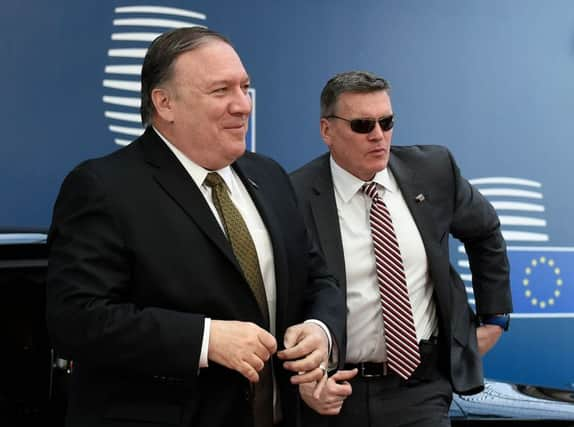Hunt warns that US-Iran conflict could break out ‘by accident’


The warning came as European Union powers gathered to thrash out ways to keep the nuclear deal with Iran afloat.
The meeting follows an announcement by the United States that it had deployed the USS Abraham Lincoln aircraft carrier strike group to the Persian Gulf to counter an alleged but still-unspecified threat from Iran, the latest in a long line of such deployments to the strategic region.
Advertisement
Hide AdAdvertisement
Hide Ad“We are very worried about the risk of a conflict happening by accident, with an escalation that is unintended really on either side but ends with some kind of conflict,” Foreign Secretary Jeremy Hunt said in Brussels.
“What we need is a period of calm to make sure that everyone understands what the other side is thinking.”
Mr Hunt added that he would “be sharing those concerns” with European partners and visiting US secretary of state Mike Pompeo.
The United States pulled out of the 2015 nuclear accord a year ago, saying it does nothing to stop Iran developing missiles or destabilising the Middle East. The Europeans insist the agreement was never meant to address those issues but has been effective in curbing Iran’s nuclear ambitions.
Tensions mounted last week, when Iranian president Hassan Rouhani said that signatories to the deal now have 60 days to come up with a plan to shield his country from the sanctions imposed by US president Donald Trump.
Mr Hunt said that “if Iran becomes a nuclear power its neighbours are likely to want to become nuclear powers. This is already the most unstable region in the world. This would be a massive step in the wrong direction.”
The meeting between Mr Hunt, his counterparts from France and Germany, and EU foreign policy chief Federica Mogherini comes as the Europeans struggle to keep financial supply lines open to Iran to offset the impact of US sanctions on the Islamic Republic’s shattered economy.
“We in Europe agree that this treaty is necessary for our security,” said German foreign minister Heiko Maas. “Nobody wants Iran to get possession of an atomic bomb and that’s been achieved so far.”
Advertisement
Hide AdAdvertisement
Hide AdMs Mogherini said the talks will focus on “how to continue to best support the full implementation of the nuclear deal”.
As the US sanctions bite, domestic pressure is increasing on Mr Rouhani to demonstrate that Iran can still benefit from an agreement based on providing it with economic opportunities in exchange for limiting nuclear development.
The Europeans have introduced a “blocking statute” protecting European companies from the effects of US sanctions, but many international corporations do more business in the United States than in Iran and have severed ties there rather than risk running foul of Washington.
Meanwhile the husband of incarcerated charity worker Nazanin Zaghari-Ratcliffe said the jail term handed down to an Iranian national accused of spying for Britain is “a real slap in the face”.
Richard Ratcliffe said it was “outrageous” that the suspect – was convicted and given a ten-year jail term.
Mrs Zaghari-Ratcliffe is part-way through her own five-year sentence after being accused of spying by Tehran’s Islamist regime, a charge she vehemently denies.
